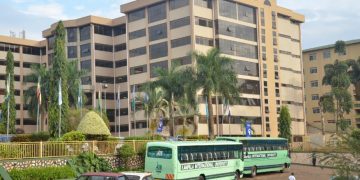The webinar, a collaboration between VODAN Africa, KIU and a few other select African universities, was hosted by Prof. Dr Mirjam van Reisen (Leiden University) and Christine Kirkpatrick.
KAMPALA — The last of the Virus Outbreak Data Network (VODAN) Africa 3-part web series exploring the role of data in decision making with special focus on Tunisia and Zimbabwe during the COVID-19 crisis, was hosted on Zoom on Thursday, May 21.
The webinar, a collaboration between VODAN Africa and Kampala International University (KIU) and a few other select African universities, was hosted by Prof. Dr Mirjam van Reisen (Leiden University) and Christine Kirkpatrick.
Panellists included Dr Mariem Ghardallou(University of Sousse), Morgan Wirtz (PhD student at Tilburg University) and Prof. Hassen Boubakri (University of Sousse) from Tunisia, and Dr Albert Muhingwa (Public Health Specialist) and Kudakwashe Chindoza(Great Zimbabwe University) from Zimbabwe.
In their presentations, Dr Ghardallou and Prof Boubakri highlighted the importance of VODAN-Africa in Tunisia, citing several issues like the high rate of Tunisian immigration to Europe, which stands at 30% of all immigrants.
They also mentioned the fact that people tend to migrate between Tunisia and Libya, with around 20,000 Tunisian nationals currently living in Libya. Another 60,000 foreigners live in Tunisia, 10,000 of these being students.
This situation presents a challenge on how to track the health and safety status of these Tunisian migrants and foreigners living in Tunisia especially in distressing situations like the current COVID-19 pandemic.

They, however, said that the burden of tracking all these has been lightened by VODAN Africa, who collaborate with the Tunisian government and Solidarity Initiatives, which are groups that help immigrants in Tunisia, to do the tracking.
For Zimbabwe, Dr Muhingwa explained the challenges they face in implementing VODAN and GO-Fair principles, which include limited access to the internet and electricity plus the lack of regular health check-ups by the citizens.
However, he said, like in the other countries, they are using available data to do some great work.
In his closing speech, Dr Mouhamad Mpezamihigo (centre, in picture), the Vice-Chancellor of KIU and Chair of the VODAN Implementation Network for Africa, said that despite all the challenges faced, they have on a positive note, reached more collaborations with universities in Uganda, Kenya, Zimbabwe, Ethiopia, Tunisia, Nigeria, Netherlands, and different international companies, including in the USA.
“The webinars have been a new interesting experience for many, Training of Trainers(ToT) is also being done, new partnerships have been made, eLearning is taking place, and opportunities for knowledge sharing and convergence is taking place,” Dr Mpezamihigo said.
He spelt out VODAN-Africa’s vision for Africa which involved Africa becoming a resource centre for verified data on COVID-19 and future outbreaks through FAIR Data Points (FDPs), solutions by Africans for Africa that will address part of the diversity concerns and putting Africa on the map by further strengthening the Euro-African bond with a basis for global knowledge sharing.
One of the outstanding takeaways from the Webinar series was the technical assistance given by the Technical Support Team of Leiden Institute of Computer Science to the participants of the Training of Trainers (ToT) course.
The Technical Support Team had among others, Mariam Basajja (left, in picture) from Uganda, coordinator and Computer Science/Data Science PhD candidate at the Leiden Institute of Computer Science.
The webinars were hosted by VODAN Africa in partnership with Kampala International University (KIU), Leiden University, Leiden Institute of Advanced Computer Science, GO FAIR US/San Diego Supercomputer Center, and RavelWorks Africa.










Discussion about this post